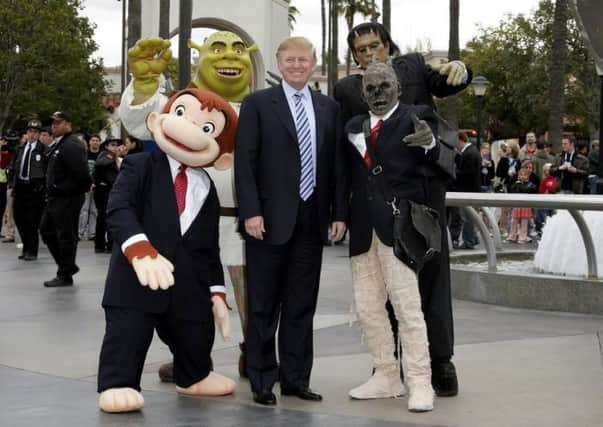Entertainment TV good for populist politicians


People glued to such programmes are more likely to vote for populist politicians like Nigel Farage and Donald Trump, say academics.
A 30 year study of Silvio Berlusconi’s commercial TV network Mediaset found more viewers voted for his right wing Forza Italia party when it featured just light entertainment.
Advertisement
Hide AdAdvertisement
Hide AdThe effect lasted for almost two decades and five elections.
The phenomenon is especially pronounced among older and young people, although in vastly different ways.
People exposed to entertainment TV as children voted almost eight percentage points more for Berlusconi compared to those who were exposed later.
They also did worse in intelligence tests as adults - adding to evidence too much time spent in front of the box harms education.
Advertisement
Hide AdAdvertisement
Hide AdThe researchers found an even stronger effect among people who were 55 and older when entertainment TV became the norm.
This group voted on average by 10 percentage points more for Forza Italia than their non-exposed peers.
“Less sophisticated”
Economist Dr Andrea Tesei, of Queen Mary University of London, explained: “Our results suggest individuals exposed to entertainment TV as children are less cognitively sophisticated and less socio-politically engaged as adults, and ultimately more vulnerable to Berlusconi’s populist rhetoric.
“Older people, on the other hand, appear to have been hooked by the light entertainment Mediaset provided and were later exposed to biased news content on the same channels.”
Advertisement
Hide AdAdvertisement
Hide AdHe said voters in Britain may be “indirectly” affected in a similar way.
Dr Tesei explained: “Popular British TV is of a higher quality than Italian but those who watch these shows may be more susceptible to simple language and slogans, such as we have seen with Trump, and during the Brexit campaign.
“It is quite subtle, and would have happened over a long period of time.
“But the dumbing down of TV in general is a concern, particularly for children growing up.
Advertisement
Hide AdAdvertisement
Hide Ad“Our study showed children who watched entertainment TV did worse in cognitive tests which has been shown in past research where they’ve been allowed beyond the recommended amounts of two hours a day.”
Voting patterns
In the study his team compared the voting behaviour of people who lived in regions where Mediaset, which was introduced across Italy in stages, was broadcast compared to those where it was unavailable.
Overall people who had access before 1985, when the network only featured light entertainment, voted on average only one percentage point more for Berlusconi, compared to areas that had access later as it rolled out.
But this masked the much wider differences among older and younger voters.
Advertisement
Hide AdAdvertisement
Hide AdThe study also found less educated high school drop-outs who got entertainment TV voted three percentage points more for Forza Italia than their non exposed counterparts.
People exposed to entertainment TV as children scored five per cent worse than peers in cognitive tests as adults.
They were also 13 per cent less likely to report an interest in politics, and 10 per cent less likely to be involved in a voluntary group.
Older people exposed to entertainment TV during the 1980s were 16 per cent more likely to watch news, traditionally slanted in favour of Berlusconi and introduced on Mediaset in 1992.
Entertainment TV
Advertisement
Hide AdAdvertisement
Hide AdThe researchers also found exposure to entertainment TV did not just increase support for Berlusconi but also for other parties with similar populist features.
Indeed, early access to Mediaset appears also to be associated with higher support for the anti-Euro Five-Star-Movement - led by ex-comedian Beppe Grillo - which first fielded candidates in 2013.
These results suggest that Mediaset influenced political attitudes and voting behaviour beyond its effect on Berlusconi’s party.
In particular, the results suggest a relationship between exposure to light-fare TV and preferences for populist parties and leaders.
Advertisement
Hide AdAdvertisement
Hide AdThe researchers used a combination of research methods, including engineer-developed software to simulate TV signal propagation, econometric analysis based on municipal-level election data, and geo referenced survey data.
The results, published in a School of Economics and Finance (Queen Mary University of London) working paper, were significant and stood up when controlled for geographical and socio-economic characteristics at the municipal level.
Dr Tesei said: “Our results suggest entertainment content can influence political attitudes, creating a fertile ground for the spread of populist messages.
“It is the first major study to investigate the political effect of exposure among voters to a diet of ‘light’ entertainment.
“The results are timely as the United States adjusts to the Presidency of Donald Trump.”